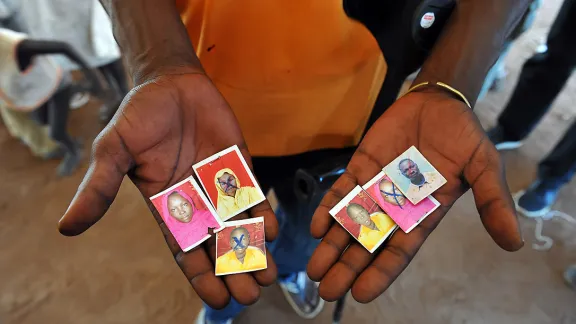
A refugee hold images of family members killed in the South Sudan conflict, Njumanzi reception center, Adjumani, Uganda. Photo: LWF/ M. Renaux
(LWI) - Renewed fighting in South Sudan has caused a new influx of refugees into neighboring Uganda.
“Since the beginning of January 2016, Uganda has been experiencing a significant increase in the influx of South Sudanese refugees. Since the beginning of the year, the Elegu refugee collection point, the main entry for refugees into Uganda, has registered 5,026 new arrivals,” Jesse Kamstra, representative of The Lutheran World Federation (LWF) Program in Uganda, says. The United Nations estimates that about 500 people from Uganda cross the border to northern Uganda each day.
These recent arrivals join 172,411 South Sudanese refugees who have arrived since December 2013, when conflict broke out in South Sudan. Currently South Sudanese refugees in Uganda are hosted in the districts of Arua with 18,117 people, Adjumani (104, 857), Kiryandongo (42, 783), and some 7,792 residing in Kampala, according to data by the UN refugee agency UNHCR on 1 December.
LWF has been assisting refugees in Adjumani district since the crisis started in 2013. In additional to receiving them at the Elegu border point, LWF transports them to Nyumanzi reception center and provides them with the core relief items they need the most. The LWF also drilled boreholes and supplies water through water-trucking at the collection point. As a mid-term perspective, LWF intervention aims to make refugees self-sufficient and to build their resilience by promoting livelihoods, general protection, and action against sexual and gender-based violence, psychosocial support, child protection and community services.
Ongoing violence despite peace agreement
Despite the recent August 2015 peace agreement which was signed in South Sudan to end 21 months of violent conflict, the influx into Uganda continues in 2016. Most of the refugees come from Eastern Equatoria, Jonglei and Upper Nile States.
The influx is reportedly triggered by the a number of factors. Among them: hunger brought on by a poor harvest, a significant fall in the value of the South Sudanese pound, which has led to high cost of living for the already vulnerable population, the unexplained disappearance of relatives and next of kin, the presence of several splinter rebel groups terrorizing civilians and by general fear brought on by the uncertainty of the peace process.
“It is already reported that 14 senior ministers lost their jobs in the new constituted transitional government,” Kamstra says. “This has created more fear because of the perceived negative reactions from these disgruntled groups.”
The Government of Uganda’s progressive refugee policy allocates land to refugees with the aim of integrating them into local communities. All South Sudanese new arrivals are granted refugee status on a prima facie basis, and issued household attestation letters after biometric registration.
“Local government capacity in responding to the needs created by the influx is stretched. This situation is bound to be exacerbated by the recent peak in new arrivals,” Kamstra says. This is especially true for Maaji settlement, which opened in late 2015 and will soon be full. “However, a joint initiative from Office of the Prime Minister, UNHCR and partners proposes a plan to establish other settlement/s to accommodate more persons of concerns in the coming months,” Kamstra says. “More support is needed to manage this crisis.”


